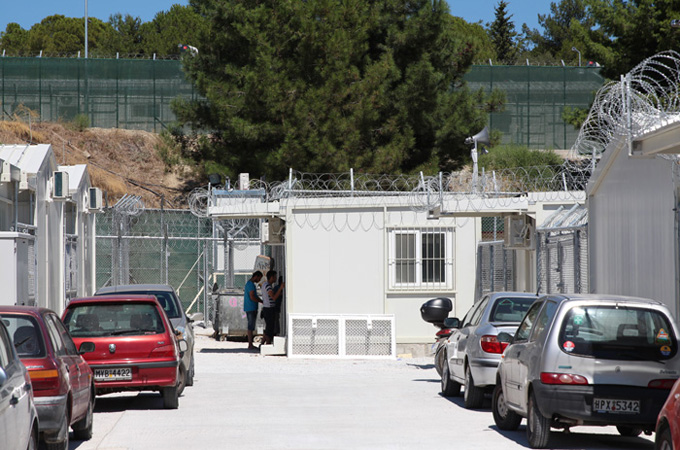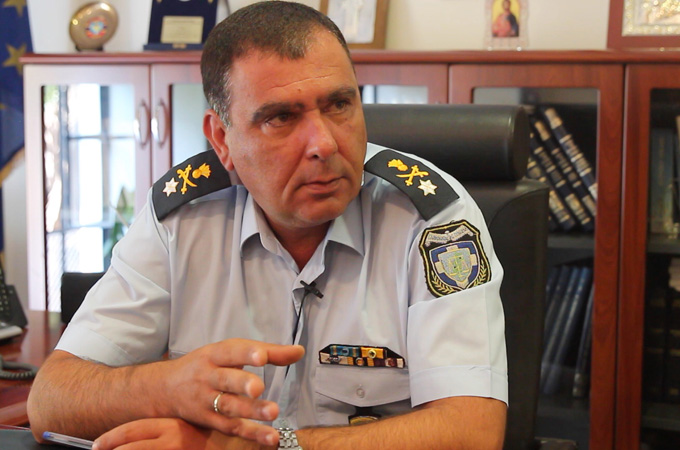The plight of Europe’s unwanted migrants
Private citizens take initiative to help ‘irregular’ migrants, accusing governments of excessive focus on security.

Lesvos, Greece – A police car pulls up to the PIKPA youth centre on the Greek island of Lesvos to drop off a new batch of “irregular” migrants.
Most of them are ethnic Hazaras from Afghanistan, and they are fresh off the boat from Turkey. But PIKPA is not an official first reception centre. It is a former youth centre, transformed into a community-run, temporary shelter for the dozens of migrants that reach the island each day.
Keep reading
list of 4 itemsIranian man loses bid to be freed from Australian immigration detention
Children of the Darien Gap
Beyond borders: Migrants online
The number of migrants arriving via the Aegean Sea tripled last year to reach 11,831, after a fence was erected along the land border between Greece and Turkey in 2012. Only a couple of hours’ boat ride from the Turkish coast, the island of Lesvos has been particularly affected.
When Moria, the government-run identification centre, runs out of capacity, the police drop migrants at PIKPA before space frees up to take them in for registration.
 |
| Moria identification centre was recently constructed to register migrants arriving on Lesvos island [Simona Foltyn/Al Jazeera] |
The journey by migrants seeking a better life in Europe is extremely dangerous. The International Organization for Migration released a report titled Fatal Journeys on Monday that found since 2000, at least 40,000 migrants have died – or about eight each day over the past 14 years.
Hundreds of people drowned earlier this month when their boat was rammed in the Mediterranean Sea.
Band-aid solution or viable alternative?
On Lesvos , the nature of its two migrant centres is very different. Recently built with the help of European Union funds, Moria is a closed facility surrounded by a barbed-wire fence. PIKPA is an open centre, run mostly through private donations made by locals.
Efi Latsoudi, one of the key individuals behind PIKPA, rejects the idea of detaining migrants upon their arrival. “This is totally against our idea of how to treat refugees … It’s a policy to humiliate them, make their life really difficult, and push them to illegal ways to stay and leave the country.”
Latsoudi says engaging civil society has changed people’s attitude towards migrants, after the rise of far-right political party Golden Dawn and populist media coverage instilled a biased and racist image.
“When you deal with them, you see that they are not dangerous – they are people like us, and sometimes you feel proud of what we are doing,” said Latsoudi.
Despite these efforts, suspicion among the community remains. A local fisherman, who spoke on condition of anonymity, told Al Jazeera. “We see them at sea every day, but we are afraid they bring diseases such as Ebola. So we prefer to stay away.”
Hamid Saljooghi is currently residing in PIKPA while his asylum procedure is under way. Previously a journalist in Afghanistan’s western city of Herat, he was forced to flee the country after repeated threats from the Taliban.
“Moria camp was like a prison,” he said. “Sometimes we were jokingly calling it the new kind of Guantanamo. But they gave us food, water and the police attitude was good – at least as long as the NGO workers were there.”
Journalists are not allowed inside Moria, or any other migrant identification, reception or detention facility. According to local authorities, the facilities – and their refusal to allow journalists to enter – are in the best interest of migrants.
“We place them in there just for their registration and segregation, and following the registration, those who travel alone or belong to vulnerable groups or families are set free. In order to achieve all this, a suitable and guarded place for their own safety is needed,” says Lagos Konstantinos, the general police director for the northern Aegean.
 |
| Lagos Konstantinos, General Police Director for the North Agean [Simona Foltyn/Al Jazeera] |
Given plans to expand Moria’s capacity from 100 to 250 people in the identification centre, in addition to 400 places in the pre-departure centre for individuals subject to deportation, it is uncertain what the role of PIKPA might be in the future. “When Moria gets bigger, then PIKPA will not be needed,” Konstantinos explains.
Focus on security
Left-leaning initiatives such as PIKPA stand in stark contrast to what Amnesty International in a recent report called a highly security-centred approach by the EU and the Greek government, which focus on militarising the border while disregarding protection of vulnerable groups.
“The system is designed to keep newcomers out, and force those who are already in the country to leave. Detention is a major pillar of that policy,” says Amnesty’s Greece campaigner and researcher Giorgos Kosmopoulos.
Under European law, detention of irregular migrants is allowed, yet the law also stipulates that it should only be used as a last resort, and after individual assessment of each case. While Italy or Bulgaria generally don’t detain migrants, the administrative detention of migrants when apprehended without legal documents is systematic and often lengthy in Greece.
European Union funding has been largely geared towards securing borders – even though Syrians and Afghans, many of whom are eligible for international protection, accounted for one-third of the 107,365 illegal border crossings in 2013.
For the period 2007-13, the Directorate for Home Affairs of the European Commission allocated €1.8bn ($2.28bn) towards securing external borders, compared to €700m ($888m) to support asylum procedures, reception services, and the resettlement and integration of refugees. National and European border agencies claim this funding is critical to fulfil their responsibility to protect common EU borders.
Frontier countries such as Greece, Italy, and Bulgaria have been calling for more EU funding to grapple with the influx of migrants. In addition to being the EU’s economically weakest, countries such as Italy and Bulgaria have also been rattled by political crises, further impeding their ability to effectively tackle the migration issue. The interim government in Bulgaria recently failed to adopt an integration action plan for the many refugees who have received humanitarian protection, but are unable to move to other European countries.
Not just charity
In light of the difficult political and economic environment in many European countries, several projects led by individuals or civil society groups have emerged to deal with the issue. In Malta, entrepreneurs Christopher and Regina Catrambone set up the Migrant Offshore Aid Station, a privately funded search-and-rescue operation to minimise loss of life in the Mediterranean.
|
|
| Greece detention centres under scrutiny |
In the Austrian village of Kirchbach im Gailtal, a local woman has taken in 48 asylum seekers in her bed and breakfast, and has helped them engage in the local community through activities such as tailoring and gardening.
In Bulgaria, volunteers set up a coordination platform to help the unprepared authorities cope with an unexpected influx of migrants during the second half of 2013.
Whether to show solidarity, counter populist rhetoric or defy corruption, many of these initiatives have been motivated by broader objectives than simply giving charity.
“We got together because we disapproved of the corruption and inefficiency behind the government-run aid programmes,” says Tzvetko Tzankovski, who has delivered dry food to thousands of refugees around Bulgaria as part of a small group of volunteers.
Maria Cheresheva, another Bulgarian volunteer, organised information campaigns to counter polarising media coverage. “The political discourse revolved around fear from extremism and the high financial support refugees were getting, which wasn’t the case. Once the issue is framed like this by media, it is extremely difficult to change it.”
Yet the involvement of private individuals in the refugee issue – a sensitive policy area that has traditionally been considered the realm of governments and NGOs – has not been without hurdles.
As the Bulgarian government finally came to grips with the number of refugees, volunteers in Harmanli, one of the country’s biggest refugee camps, were no longer allowed to deliver food. Lydia Staikova, who volunteers at Harmanli, recently submitted an action plan to the camp’s director to propose other activities geared towards integration.
But, she says, “We are still not fully trusted. Being a volunteer in Bulgaria is a very strange thing, so people expect some agenda that we are hiding.”